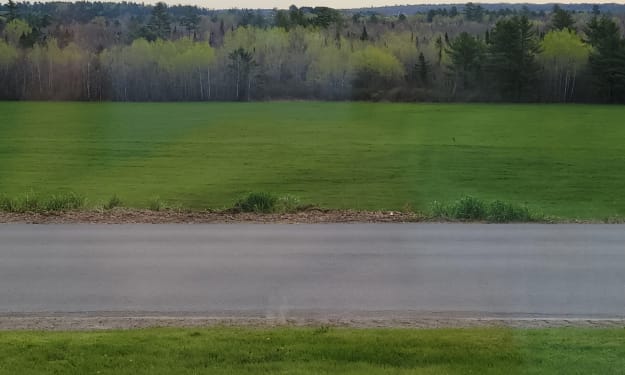A Cut Above
Teachers that make or break students

“I didn’t know how to tell him that I needed to know the ‘why’ before I could understand the ‘how.’ I was twenty years old! It took another twenty-five years to sort that out. He passed years ago, but I highly doubt he’d believe what I’m doing now. I’m sure I’ve told you that he used to have to reteach almost every lesson to me in his office because I didn’t comprehend enough of the material in class. No, there’s just no way he ever would’ve seen this coming.” I said this today to a college student at the correctional facility where I work.
My late professor had bent over backwards to help me pass a subject I was convinced I’d never need again. I majored in history education, for goodness’ sake. Fundamentals of Math nearly killed me. The fact that he took it upon himself to tutor me through was a testament to his character, and I’ve never forgotten that. I shake my head in disbelief, though, wondering how I missed the fundamental issue I faced during those years: If I didn’t understand why, I couldn’t learn the how.
It all began in elementary school. I loved school (except for swimming lessons) and had straight A’s until fourth grade, when I got a teacher who didn’t understand the math that she was required to instruct. That’s the only explanation I can find for how poorly my year went, and for the shoddy foundation she gave me for the rest of my formal training in mathematics.
She taught what the teacher’s manual provided, and she knew the answers to the questions that were provided in the back of the book. When she gave us time in class to work on assignments, the kids that were good at math got to ask questions, but we who struggled were ignored and even vilified. When we showed up the next day with our work incomplete, she’d assign penalties called “sentences,” in which we had to write, “I will have my homework done on time,” 25 times, plus complete the missing work (without her help on the ones we didn’t understand—because she didn’t know how to help us), plus the new assignment. If we didn’t get the sentences done by the next day, she’d assign more sentences: “I will get my sentences done on time,” plus the original ones, plus the homework—you get the idea. It was like the government demanding payment plus interest upon interest. Was it any wonder that I hated school by the end of fourth grade?
The following year, my parents moved me to a new school. I loved the school, but I fell further behind in math due to circumstances beyond their control. In high school, my Algebra One teacher managed to make enough sense to get me through that program, but geometry was a lost cause and Algebra Two never happened. My college allowed me in on a waiver because my high school had a catastrophic incident disrupt learning and that was why I didn’t get my second year of algebra or foreign language.
As a teacher candidate, however, I could not avoid college mathematics, so I looked for the easiest course offered and enrolled in it. Dr. D soon discovered that I wasn’t exaggerating when I said that I “didn’t understand math.” To this day, I don’t know I passed that course. What I remember from it was his gracious tutoring. What I took from my life experience in math was fear, loathing, and hate for the subject.
Upon graduation, I left the United States for nearly seven years in northern Japan as a teacher of conversational English and English Bible studies in conjunction with the Orthodox Presbyterian Church Japan Mission. It wasn’t my intention to be there seven years. I went with two years in mind and kept adding on. Finally, the time arrived to return to the USA, and I took a job as headmaster of the Christian school I’d started attending in fifth grade. To my surprise and disgust, I used a significant amount of math in that role. To my greater distaste, I began defending algebra to skeptical students who frequently asked, “When will I ever use this in real life?”
A decade later, it was time to pursue teaching full time. My history education degree from Georgia didn’t translate directly to Maine’s social studies teacher requirements, so I took a couple of classes to obtain the necessary certification. Unfortunately, social studies teachers that don’t coach a sport aren’t in demand, either, so I took the one job I could find with anything close to steady hours: Substitute teaching in a youth correctional center. The biggest drawback to that, apart from the limited pay and hours, was that I’d be subbing for math teachers. The fear, loathing, and butterflies started almost immediately.
It was as bad as I’d feared, and the students smelled the blood in the water. After a couple of particularly bad experiences I finally told my boss, “Please ask the other sub to fill in with that class.”
She replied, “No. They need YOU.”
“Me?? What do you mean, they need ‘me’?”
“You listen to them. You don’t throw them out of class.”
“I did yesterday.”
“But you don’t usually do that. Just be yourself. You have a good presence in the classroom. They need that.”
“Fine. I’ll be there.” How can I say no?
“Good man.”
A week or so later, I tested her theory that I was the right man for the job. I’ll warn you about the language right now.
Dr. C was out for two days in a row. Normally, he was really good about leaving thorough sub plans, but that week he forgot the second day plans for Little Man Big Mouth (LMBM) , and LMBM decided to let me hear about it. I’d given everyone else their assignments and they’d started working on their laptops at various places around the room, but try as I might, I couldn’t find anything new for him to do.
LMBM: “Well?”
Me: “Sorry, man. I’m not finding anything new for you to do. There’s not much I can do about it.”
LMBM: “You’re not good for much, are you, you fat f*ck!”
At that moment, the room went silent, and all heads turned toward me. I knew they were expecting me to blow my top, so I took a different tack.
Me: “It’s interesting you called me that.”
LMBM: “What??”
Me: “I said, ‘It’s interesting you called me that.’” His face turned pink as he realized what I was talking about. Before he could say anything else, I moved on. “I say it’s interesting, because I got something at my house last week that shed some light on that. I’d never seen one before, and I have to say, it’s opened my eyes to a reality that explains soooo much of what you and other fellas here have been saying to me and about me ever since I started working here!”
By this time, LMBM’s face had turned from pink to deep red, and his classmates had begun to chuckle. I didn’t let up.
Me: “Y’know, it’s one of those things that you can look at and see what everyone else sees? What’s it called? A m-m-m…a mi-mi-mi…a mir..” As I struggled for the word, the class roared with laughter and LMBM turned purple. “Oh! the word is MIRROR! That’s it, a mirror! Yeah, so guess what? I’m FAT! I never knew that before!”
LMBM’s face was full of embarrassment while his classmates fell off their chairs, rolled on the floor, and gasped for air in their amusement.
Little Man Big Mouth burst into the tumult, “I’m sorry! I shouldn’t have said that.”
“You’re absolutely right about that, but I accept your apology,” I replied. “And all of you should know that if you’re gonna insult me, be more creative. Good Lord, I’ve been called fat since I was a kid.”
Now, some colleagues have criticized me for shaming a bratty teenager to make a point, but until they face the same situation and teach a lesson that will be remembered like this one was—word got around that I stuck up for myself and the youth started showing me respect—I don’t listen to the critics. In fact, more than a decade later, some of those youth who are now adults, have connected with me on social media and thanked me for helping them through tough times in their lives. I’m proud of them for fighting through their challenges and working hard every day.
Eventually, I earned a full-time gig there, but it stopped serving youth and became an adult correctional facility. My fear and loathing of math went up several notches when I was forced to attend training on teaching math to adult learners of math by adult ed teachers who don’t usually teach math. (Got that? Yeah.) On the first day, I wouldn’t even give my first name. Instead, I used a pseudonym. If it hadn’t been for a super-supportive colleague, I never would’ve made it. “Just tell yourself, ‘I’m a math teacher,’ and you’ll be fine,” he said.
The training lasted six sessions over several months. The emphasis was on the why. You know, the part I’d never learned in school? Yeah, that. By the end of that training, I signed up for the next one: Teaching Algebra to Adults. I. Was. Hooked.
In fact, the following year, I took it again. I had begun to teach math and I loved it. I get the chills writing that. I’m blown away by the idea that Pam M and her course helped me learn the WHY of math that I’d never comprehended before—and I’d never known how to ask before—to the degree that I FINALLY understood well enough to teach it to others and enjoy it!
And then it stopped. A math teacher was hired, other responsibilities were added to my plate, and I didn’t need to work with that anymore. I’m sure you know what they say about math: If you don’t use it, you lose it. Years passed, and I wasn’t using it. I remembered a few elements of the courses I took, but I lost too much and frustration began to set in again. We hired peer tutors to help my students when the math teacher left, and I did my best to follow along with their instruction. Over a two-year period, tutors worked with my students, and I relearned all I could.
My turn to teach math arrived once more. I looked to the books used in the adult ed training. We’d focus on concept over procedure, I told my students. By the time we completed a dozen lessons—a half dozen each in operations on numbers and algebraic thinking—they took off on their own and had enough knowledge to learn the rest on their own! It was magical!
Men come to my classroom to work toward earning their high school equivalency diplomas, and now in 2024, I no longer fear helping them with the toughest subject: Mathematics. I don’t know all the ins and outs of it, but I know enough to help them on their way, and that’s not because of what I learned in K-12 education, or even in college academics. It’s because of the love and patience of people like Dr. D and Pam M, the former tutoring me when I had no idea what the subject matter meant, and the latter helping me see the WHY of math so that the HOW would stick in my brain at long last.
Every teacher should be a lifelong learner, and it shocks me to recognize that the one subject that I used to call me academic enemy has become a love. The more math I learn, the more beauty I see in it. The more beauty I see in math, the more I respect it. The more respect I have for math, the easier it is to pass along the knowledge of it to men like Little Man Big Mouth, and to help them see the doors it opens for them to have a better future than their past suggests. Great teachers like Dr. D and Pam M are a cut above.
About the Creator
Mack D. Ames
Educator & writer in Maine, USA. Real name Bill MacD, partly. Mid50s. Dry humor. Emotional. Cynical. Sinful. Forgiven. Thankful. One wife, two teen sons, one male dog. Baritone. BoSox fan. LOVE baseball, Agatha Christie, history, & Family.






Comments (1)
Hi Md ~ I'm certainly all about reach-back stories; but, back to 'Elementary School' may be a bit far for most. - I've admired your work; and also that we both have memories of living in Japan - Arigato - as well as both of us being 'Educators'...I'm a ProBono adjunct Professor. Sorry you haven't taken a peek at any of mine; I don't solicite, ever. But, I'm posting a new story into 'Humor' on the 1st "Twins" that, once again, I've sketched my own lead-in. You may relate to that one; especially re; the school Twin-Stand-Alone theory that is paragraphed within the piece...? Please ask me to unsuscribe you if you think I'm being a 'noodge.' I will delete this comment soon. Jay